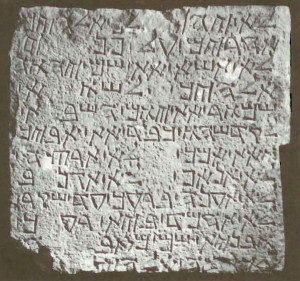Throughout the Second Commonwealth Judeans and Samaritans were engaged in intermittent conflict. Many scholars, on the basis of studies of the Samaritan Pentateuch and the Samaritan script, have concluded that the schism should be dated to the building of the Samaritan Temple on Mount Gerizim late in the Persian period and its destruction by the Hasmonean king John Hyrcanus in 128 B.C.E. These scholars maintain that the officials of Samaria who opposed the rebuilding of Jerusalem cannot be identified with the later Samaritan sect. This distinction seems to be overdrawn. Granted that the schism was the result of a long process, its earliest stages are to be observed already in the early years of the Persian period.
The Samaritans were a mixed people, made up of Israelites who had not been exiled when the Northern Kingdom was destroyed in 722 B.C.E. and people of various foreign nationalities whom the Assyrians had resettled in the area in an attempt to ensure that Israel’s national aspirations could not again come to the fore. This mixed group had adopted a syncretistic form of Judaism that combined old northern traditions with those of the resettled nations. When work began on the Temple, the Samaritans approached the Jews to join in the project. The Judeans rejected the Samaritans because of their questionable descent.
In First Temple times it was possible for foreigners to join the Jewish people in an informal way by moving physically and socially into the land and adhering to its religion and laws. During the exile, Judaism had been transformed from a nationality which depended on a connection to the land and culture to a religious and ethnic community which depended upon descent. How else could Judaism have ensured its continuity when deprived of its homeland? The returning Jews from Babylonia could not accept the questionable genealogy of the Samaritans. On the other hand, there was not yet a system for religious conversion like that developed somewhat later on in the Second Temple period. Hence, there was no choice but to reject the Samaritans, even had they agreed to abandon their syncretistic practices. In response to their rejection, the Samaritans attempted, although with limited success, to influence the Persian authorities to halt the rebuilding of the Temple and to limit the powers of the priestly and temporal government of the Jews.
The Samaritan issue was no doubt complicated by another long-smoldering problem. As far back as the earliest days of the monarchy there had been a division between north and south. It was this sectionalism which eventually led to the division of the kingdom after Solomon’s death. We cannot doubt that the northerners had opposed the centralization of sacrificial worship at Jerusalem during Solomon’s reign. The north rejected all efforts to centralize worship at the Jerusalem Temple. Accordingly, after the kingdom was divided, the northerners set up sanctuaries at Bethel and Dan. The very same opposition to the centralization of worship in Jerusalem must have helped to motivate the leaders of Samaria in their attempts to hinder the reconstruction of the Temple by the returning Judeans.
DIG DEEPER:
- Historical Surveys
- Primary Sources
- Ezra 4- The Samaritans and the Temple
- Josephus, Antiquities XI, 297-303- The High Priest and the Samaritans
- Esdras 2- Opposition to the Temple
- Abu’l Fath, Kitab Al-Tarikh- The Samaritan View of their Origins (Stenhouse Trans. From Anderson- The Keepers)
- 2 Kings 17- The Jewish View of Samaritan Origins
- Josephus, Antiquities XI, 75-108- Samaritans and the Restoration of the Temple
- Secondary Sources
To a great extent, then, the Samaritan issue in the early Second Temple period was a continuation of the north-south schism of the First Temple period. Like their northern predecessors, the Samaritans insisted on their right to sacrifice outside Jerusalem. In the Persian period, the Judeans rejected the Samaritans due to their syncretistic worship and the presence of non-Israelite elements among their population. Obeying the laws in the Book of Deuteronomy and heeding the injunctions of the prophets, they could not accept the Samaritans.
Excerpted from Lawrence H. Schiffman, From Text to Tradition, Ktav Publishing House, Hoboken, NJ, 1991.
